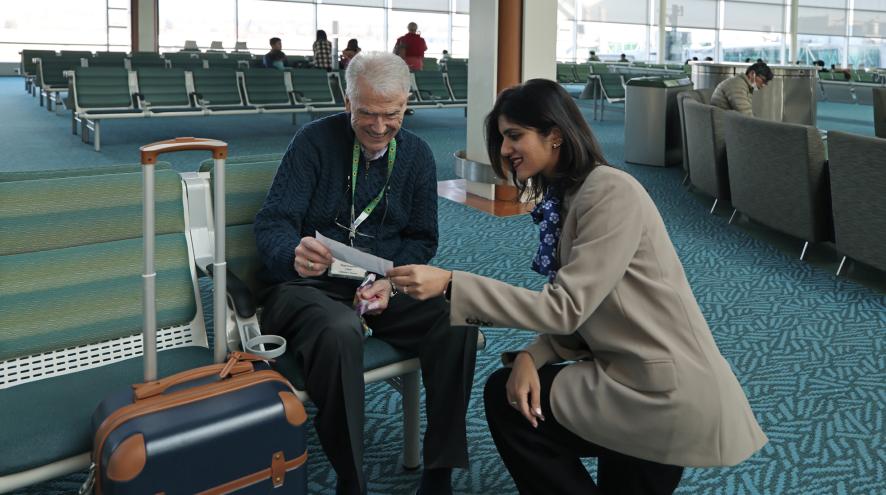Travel tips to support someone living with dementia
With preparation and the right adjustments, travel with a person living with dementia can still be enjoyable and meaningful.

Travelling can be one of life’s greatest joys, an opportunity to explore, visit friends or simply take a relaxing vacation. However, for people living with dementia, a disease that can affect memory, orientation and the ability to process information, travel can be a source of anxiety. That doesn’t mean it’s impossible, though – with preparation and the right adjustments, travel can still be enjoyable and meaningful.
Considerations before travelling
People living with dementia generally do best in familiar settings. Travel is also often easier in early stages of the disease, as disorientation, agitation or distress may become too difficult to manage in later stages.
Caregivers take on many roles, from travel agent to planner to tour guide. They work behind the scenes to ensure an enjoyable travel experience. Communicate openly before the trip, discuss expectations and concerns together and create an itinerary with plans for potential emergencies. Recognize that someone may function differently while travelling because of the stress from unfamiliar environments and changes in routine.
Knowing if travel is feasible right now
Before planning a trip, consider whether it would be safe for the person living with dementia currently. Warning signs that travel may not be a good time include:
- Increased disorientation or agitation, even in familiar settings.
- Wanting to return home shortly after going out.
- Increased anxiety around upcoming appointments.
- Anxiety or withdrawal in crowded and noisy settings.
- Concerns about incontinence.
- Becoming lost more easily.
- An increase in delusional, uninhibited or other challenging behaviours.
A trial run may help you understand and establish the current capacity for travel. If your big trip is going to involve flying, consider a shorter flight first. You could also just check into a local hotel for a few nights.
Planning tips to support successful travel
If you feel comfortable proceeding, preparation is the key to reducing confusion and stress. Some things to consider:
- Choose familiar destinations, hotels or restaurants when possible.
- Consider the simplest mode of travel – a direct flight is simpler than a long car drive, while a train may make it easier to manage changing time zones.
- Avoid peak travel seasons to reduce crowds and delays.
- Request airline support in advance, such as early boarding and mobility assistance.
- Build in flexibility, slower pace and frequent breaks.
- Consult with the physician about travel plans; carry copies of prescriptions, medication lists and legal documents such as a power of attorney.
- Bring extra medications, clothing, snacks and water.
- Keep identification, emergency contacts and destination information with the person at all times.
Travel involves taking on additional responsibilities. For caregivers, rest before and during a trip is important. If possible, bring a second support person to share caregiving needs and prevent burnout.
Meaningful alternatives to travel
As dementia progresses, travel may become overwhelming or unsafe. However, there are still meaningful ways to create positive experiences without going far from home. Staycations, day-trips or short visits to local parks, beaches or favourite restaurants can provide enjoyable and manageable outings. Another alternative is an at-home “tourist experience”, for example, exploring local neighbourhoods or gardens, can make ordinary days feel special. Reminiscing with old travel photos, souvenirs and stories from past trips can also bring meaningful conversations.
If you would like more tips on holiday travel with someone living with dementia or support for managing other aspects of the disease, our First Link® Dementia Helpline is here to help:
- English (B.C.): 1-800-936-6033
- Cantonese and Mandarin (B.C.): 1-833-674-5007
- Punjabi, Hindi and Urdu (B.C.): 1-833-674-5003
- English (Yukon): 1-888-852-2579
Our First Link® team can answer your questions, connect you with local resources and offer practical tips for living well with dementia – support is just a phone call away.
